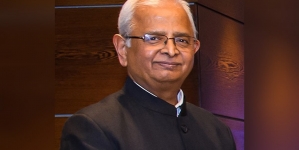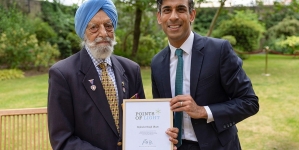-
CANBERRA: India-Australia partnership aims to bridge skill gap for future employment - April 15, 2024
-
HOUSTON: Mumbai boys in the final rounds of FIRST World Robotics competition to be held in Houston - April 14, 2024
-
MADRAS: IIT Madras NPTEL translates thousands of technical courses into several regional languages - April 10, 2024
-
MUMBAI: Shahid Kapoor opens up about the challenges faced by character actors in Bollywood - April 8, 2024
-
NEW DELHI: World Health Day 2024: Date, Theme, History, Significance and Interesting Facts - April 6, 2024
-
LONDON: Indian-Origin Teen In UK Gets “Life-Changing” Cancer Treatment - April 3, 2024
-
BENGALURU: Indian scientists unravel genetic secrets behind lumpy skin disease outbreak - March 30, 2024
-
NEW DELHI: Youngsters’ Increasing Stress Levels, Early Onset of Diseases an Alarming Health Trend: Apollo Hospitals Chief - March 28, 2024
-
MARYLAND: All About Pavan Davuluri, New Head Of Microsoft Windows - March 27, 2024
-
MUMBAI: Pyaar Kiya To Darna Kya turns 26: Kajol says THIS was the symbol of an innocent girl back then - March 27, 2024
LONDON: UK-Based Think Tank Warns Of “Anti-Hindu Hate” In Schools In Britain
LONDON: Incidents such as Hindu pupils being bullied to convert to Islam and beef being thrown at another are among some illustrative examples recorded in a new report by a UK-based think-tank released on Wednesday, warning against the prevalence of anti-Hindu hate in schools in Britain.
‘Anti-Hindu Hate in Schools’, by the counter-terrorism think-tank Henry Jackson Society, found that 51 per cent of Hindu parents surveyed reported that their child has suffered anti-Hindu hate at school. It also recorded that teaching on Hinduism was reported by some participants of the study as fostering religious discrimination towards Hindu pupils.
“This report highlights the prevalence of discrimination against Hindus in British schools, with 51 per cent of Hindu parents surveyed reporting that their child has suffered anti-Hindu hate at school,” the report concludes.
“The findings underscore the urgent need for greater awareness and understanding of the Hindu experience in schools and further research into other lesser-known types of prejudices that may be manifesting in Britain’s classrooms. It highlights the need for more specific and accurate reporting mechanisms to capture such incidents,” it notes.
Religious Education (RE) is compulsory in schools in England up to the age of 16, with the option to take it as an exam module under the GCSE curriculum. The report’s analysis is based on freedom of information (FOI) requests from 1,000 schools around the country, alongside survey results from 988 parents about the experience of schoolchildren.
“This report has shone a torch on an important issue. If we have children fearful of going to school, that is not acceptable – regardless of their faith,” said Baroness Sandip Verma, during a launch event for the report.
Charlotte Littlewood, the author of the report, said her focus on schools emerged over the course of her analysis of the violence that broke out between Hindu and Muslim communities in Leicester last year, in the wake of an India-Pakistan cricket match in the Asia Cup held in Dubai at the end of August.
“What we found was that teachers were playing into the problem, including covering reductive and in some places prejudiced views of Hinduism,” said Littlewood.
“If we are to be an equal Britain moving forward, we have to tackle all forms of hate in our classrooms,” she said.
Her report notes that some of the discrimination exhibited in the classroom showed similarities to the manifestations of hate witnessed during the unrest in Leicester between Hindus and Muslims.
“There were numerous instances of derogatory references made towards Hindus, such as mocking their vegetarianism and belittling their deities, which were also made by Islamist extremists rallying against the Hindu community in Leicester. Twenty mentions of Hindus being held responsible for politics and social issues in India is reminiscent of the treatment of Jews with regard to Israel and of Muslims in the post-9/11 climate,” the report notes.
It makes a series of recommendations for the government, including the need to record all types of hate-based bullying, reporting of such incidents, specialist demographic and faith-based training for schools, and greater engagement with the Hindu community.
























